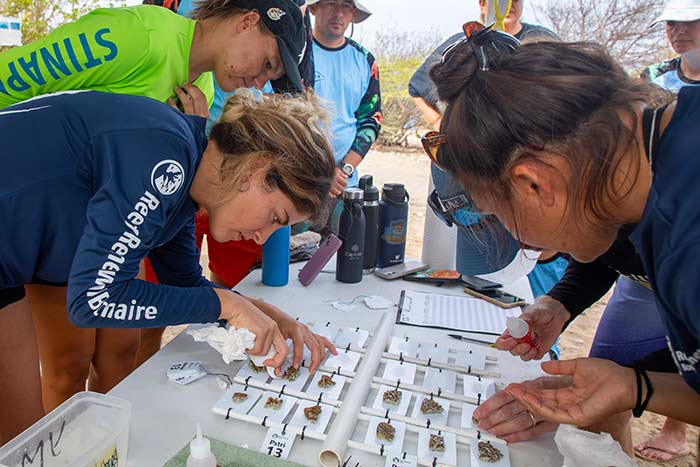A Successful Restoration Workshop on Bonaire.
This week, the Dutch Caribbean Nature Alliance (DCNA) hosted a Reef Restoration Workshop on Bonaire, bringing together over 20 experts in coral reef restoration. Topics ranged from fish reproduction to coral outplanting, fostering knowledge sharing and collaboration in efforts to safeguard the coral reefs.
Coral reefs are crucial to the health of the Dutch Caribbean islands and provide invaluable services to marine life and human communities. They act as natural barriers, protecting coastlines from erosion and storm damage while also supporting fisheries and tourism sectors vital to the Dutch Caribbean’s economy and well-being.
Alongside global climate change, local issues such as unregulated coastal development, inadequate waste management, and invasive species contribute to reef degradation. Besides addressing these issues, reef protection and restoration are essential for building resilience against future stressors.
Restoration Workshop Highlights
From June 17-19, participants attended lectures and presentations to deepen their understanding of reef restoration techniques. Experts from the Reef Renewal Foundation Bonaire, Caribbean Research and Management of Biodiversity (CARMABI), and SECORE International discussed coral restoration methods. The Coral Spawning Lab shared advancements in land-based coral spawning techniques. Van Hall Larenstein covered the restoration of native herbivores like sea urchins and snails, which help reduce harmful algae and improve coral survival. Diergaarde Blijdorp (Roffareefs) presented novel approaches to herbivorous fish reproduction. Additionally, MPAConnect/AGRRA shared insights from their Coral Restoration Roadmap Planning workshop in Florida.
Hands-On Learning
The workshop also included practical field activities led by Reef Renewal Foundation Bonaire and Diergaarde Blijdorp (Roffareefs). Participants engaged in coral fragmentation and micro-propagation techniques, studied fish breeding behaviors, and participated in local reef restoration exercises. This combination of classroom and fieldwork equipped attendees to apply their skills to ongoing and future projects.
The Path Forward
Coral reefs are crucial to the health of the Dutch Caribbean islands. They face threats from climate change, invasive species, pollution, and overfishing. Tackling these issues alongside reef protection and restoration efforts is essential for enhancing coral ecosystems’ resilience against future stressors.
DCNA’s Conservation and Restoration of Key Habitats Program invites stakeholders across the Dutch Caribbean and beyond to join this vital initiative to safeguard biodiversity, enhance coastal resilience, and support sustainable livelihoods.
(Source: DCNA, Photo Credit: Casper Douma- all rights reserved)










